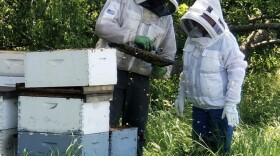Hello, Radio Readers – I’m Jason Harper, food and fiction connoisseur (as well as a solely self-proclaimed chef and author) coming to you from Hays, Kansas. I’ll be talking about High Plains Public Radio Reader's Fall 2017 theme – Food and Story, delivering the final segment of my four-part Book Byte about Five Quarters of the Orange, a novel by Joanne Harris.
In the novel, Five Quarters of the Orange, the narrator, knowing that the scent of oranges brought on her mother's severe migraines, began to seek, find, and hoard orange peels, because the very smell of them — whether real or imagined — would trigger her mother's migraines, thus buying hours of unsupervised freedom.
Today, my focus is whether there could be a connection between the sense of smell and brain illnesses.
It’s well-documented that some migraine sufferers report heightened sensory sensitivities to light, noise, or smells.
There is also a body of research that shows olfactory hallucinations — smelling things that everyone else is sure is not there — has some connection to people who have frequent migraines. Some migraine sufferers even develop a fear of a particular odor.
So it is no surprise at all that Harris incorporated this dread of the smell of oranges into her story. Years ago, “Mad Men,” the serial drama about a New York City ad agency in the 1960s, aired an episode titled "The Arrangements” where a character with a history of stroke and dementia is eating chocolate ice cream, yet he says it smells like oranges. Very shortly afterward, he dies while standing in line at a grocery store.
In Stephen King’s novel The Shining, there are not one but two characters in who smell oranges immediately before they "Shine" — which, in the novel, is the cognitive ability to read minds and mentally converse with others who have the same ability.
While olfactory hallucinations cannot be grounds for a diagnosis for a particular mental or brain illness, abnormalities in the sense of smell are commonly reported who have them. Harris’s incorporation of this detail adds rich, credible, valuable detail in the characterization in the novel.
As we can see, food and food connections pepper this book on multiple levels, and leaves the reader with quite a lot to chew on. Overall, FIve Quarters of the Orange was a delight to eat.
Bon appetite!





